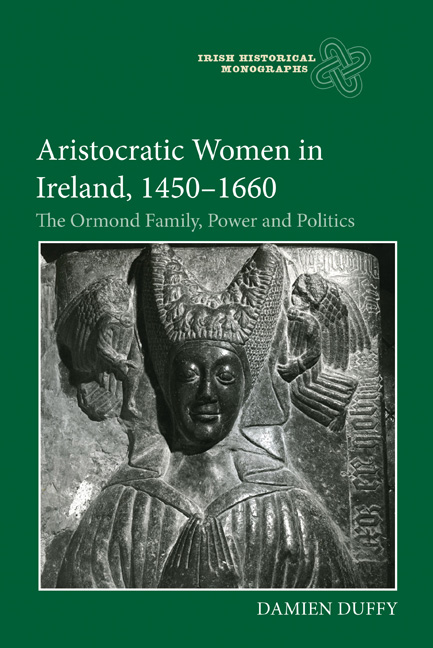Book contents
- Frontmatter
- Dedication
- Contents
- Preface
- Acknowledgements
- List of Abbreviations
- Introduction
- 1 Aristocratic Women’s Lives in Late Medieval and Early Modern Western Europe
- 2 The Ormond Women Through the Wars of the Roses and Immediate Aftermath: Marriage, Absenteeism and Illegitimacy
- 3 New Beginnings: The Heiresses, the Usurper and Royal Intervention – the Succession of Margaret and Anne Butler
- 4 Dynastic Consolidation and Female Political Entity: Margaret Fitzgerald, Countess of Ormond and Ossory (1472–1542)
- 5 Family, Marriage and Politics: The six Daughters of Margaret Fitzgerald and Piers Butler and the Ongoing Revival of the Earldom in the Sixteenth Century
- 6 ‘You have too Piteous a Face to be a Warrior’: Joan Fitzgerald, Countess of Ormond, Ossory and Desmond – Agent, Peace Broker, Advocate
- 7 Black Tom’s Women: Unions, Succession and Decline
- Conclusion
- Bibliography
- Index
- Irish Historical Monographs Previous Volumes
7 - Black Tom’s Women: Unions, Succession and Decline
Published online by Cambridge University Press: 26 March 2021
- Frontmatter
- Dedication
- Contents
- Preface
- Acknowledgements
- List of Abbreviations
- Introduction
- 1 Aristocratic Women’s Lives in Late Medieval and Early Modern Western Europe
- 2 The Ormond Women Through the Wars of the Roses and Immediate Aftermath: Marriage, Absenteeism and Illegitimacy
- 3 New Beginnings: The Heiresses, the Usurper and Royal Intervention – the Succession of Margaret and Anne Butler
- 4 Dynastic Consolidation and Female Political Entity: Margaret Fitzgerald, Countess of Ormond and Ossory (1472–1542)
- 5 Family, Marriage and Politics: The six Daughters of Margaret Fitzgerald and Piers Butler and the Ongoing Revival of the Earldom in the Sixteenth Century
- 6 ‘You have too Piteous a Face to be a Warrior’: Joan Fitzgerald, Countess of Ormond, Ossory and Desmond – Agent, Peace Broker, Advocate
- 7 Black Tom’s Women: Unions, Succession and Decline
- Conclusion
- Bibliography
- Index
- Irish Historical Monographs Previous Volumes
Summary
As the example of Joan Fitzgerald vividly attested, many of the Ormond women exercised significant influence as individuals beyond their private domestic spheres, and gained recognition and respect both publicly and politically, independent of their fathers, husbands or sons. Like Joan, several also exercised considerable agency in choosing husbands or protecting their sons’ wardships during widowhood. The lives of the following six Ormond women were significantly shaped by arguably the most formidable head of the dynasty in the sixteenth century: Thomas Butler, tenth earl of Ormond, eldest son of Joan and her husband James Butler, ninth earl. The women in question are his three countesses, Elizabeth Berkeley, Elizabeth Sheffield and Helen Barry; his sole daughter and heiress Elizabeth Butler; his cousin Ellen Butler, wife of Walter Butler, eleventh earl; and lastly Thomas's granddaughter Elizabeth Preston. Given that Thomas was pivotal in shaping the fortunes of the earldom and exerted significant influence over his three wives and his daughter, it is worthwhile to explore briefly his career, his standing at court and in Ireland, his relationships with the crown, the Dublin administration, his extended family, and his stewardship of the earldom, before focusing on the lives of these women and specifically their relationships with him.
According to Edwards, Thomas Butler's term as tenth earl of Ormond from 1554 when the earl returned from London where he had spent his youth until his death in Kilkenny in 1614, was the ‘golden age’ of the earldom. As earl, Thomas became the most powerful figure in Elizabethan Ireland and one of the leading noblemen in the Tudor and Stuart dominions, holding more political offices than any preceding earl of Ormond. Because during Elizabeth's reign Ormond was, according to Wallace MacCaffrey, ‘the one Irish nobleman at home in the court’ and an especially ardent personal supporter of the queen, he was often obstructive in dealing with successive chief governors charged with pursuing official crown policy aimed at reducing the power of overmighty regional magnates. Much to the annoyance of her officials in Ireland, as Elizabeth increased the wealth and status of her cousin, Ormond ‘went over the heads of the Irish chief governors … appealing directly to the queen in London’.
- Type
- Chapter
- Information
- Aristocratic Women in Ireland, 1450-1660The Ormond Family, Power and Politics, pp. 184 - 231Publisher: Boydell & BrewerPrint publication year: 2021



